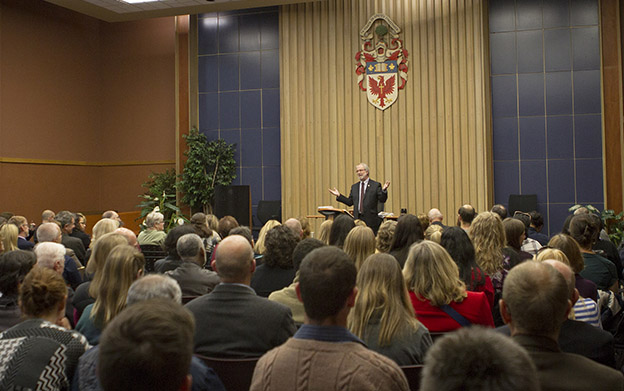Patrick Deane speaks about McMaster’s next decade

'The only constant is change.' McMaster president Patrick Deane began his talk with a quote from the Greek philosopher Heraclitus.
President Patrick Deane spoke to a packed house in Council Chambers on November 5 about what lies ahead for McMaster University and other institutions of higher learning.
“A university degree is now intrinsic to the economic ambitions of our province,” he said. Between 2002 and 2012, Ontario’s university system grew by 160,000 spaces – and is expected to grow by a further 60,000 by 2020. However, Deane noted that it has been challenging ensuring funding keeps pace with this phenomenal growth.
Deane reflected on the many successes over the past five years as the principles of Forward with Integrity were embraced and enacted across campus, pointing to significant achievements in research, teaching and learning and community engagement.
Deane cautioned against several trends that are “fundamentally at odds” with universities’ longstanding mandate to develop human potential, foster intellectual curiosity and provide academic freedom.
He stressed the importance of curiosity-driven research, as a prerequisite for success with commercialized research and more broadly, with the academic mission of the University. As noted in the Q&A after Deane’s talk, many of the world’s most significant discoveries have arisen, often unexpectedly, from curiosity-driven research and it is imperative we work to strengthen this work and connect it to students and the community.
There was also context and comment on current opinions and views about the role of universities.
Deane noted there is a view universities should exist solely to prepare job-ready graduates. While he agreed wholeheartedly with the need to prepare students for careers, Deane also commented on the unrealistic expectation that young adults should be able to make life decisions by the age of 21 or 22.
Deane also noted the increasing trend toward viewing education as an exportable commodity for commercial gain. While he noted that technological and demographic changes will also be significant factors to contend with in the years to come, it is the commodification of education that could “increasingly compromise what we want to achieve.”
Deane made note of McMaster’s Strategic Mandate Agreement with the provincial government, which builds on the principles of Forward with Integrity and reflects the University’s leading position in the province. “McMaster is highly valued for its total vision of what a university should be,” said Deane.
In closing, he encouraged the McMaster community to continue building on the momentum forged over the past several years through FWI. He said he does not expect a dramatic departure from the principles of FWI and has great confidence in McMaster’s ability to continue to achieve against these goals. Moving forward, he stressed the importance of strengthening McMaster’s research profile, while maintaining its integral relationship with teaching and learning.
Titled “McMaster in the Next Decade: Vision, Challenges and Opportunities,” Deane’s talk was the second in this year’s round of McMaster Seminars on Higher Education. The free event was open to all on campus and in the community.
A professor in the Department of English and Cultural Studies, Deane began his tenure as McMaster’s president and vice-chancellor on July 1, 2010. In a unanimous decision by McMaster’s Senate and Board of Governors, he was reappointed for a second five-year term this September.


